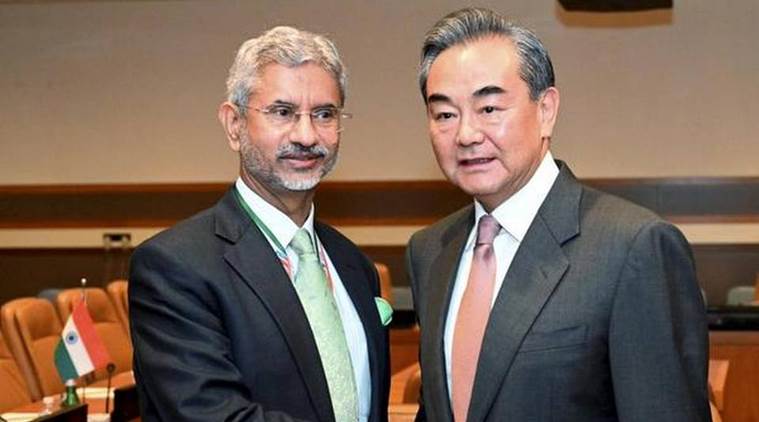 Jaishankar-Wang Yi phone call: Angry phone call, and accusing each other, but ending on a note to cool down the situation. Delhi asks Beijing to take corrective steps. (Photo: PTI)
Jaishankar-Wang Yi phone call: Angry phone call, and accusing each other, but ending on a note to cool down the situation. Delhi asks Beijing to take corrective steps. (Photo: PTI)
Claim on Galwan valley: As Beijing staked claim over Galwan Valley, India said it is not in accordance with China’s own position in the past. Beijing never claimed the valley since 1962.
China: Galwan Valley is located on Chinese side of LAC in west section of China-India boundary. For many years, Chinese border troops have been patrolling in this region. Since April this year, Indian border troops have unilaterally and continuously built roads, bridges and other facilities at the LAC in Galwan Valley.
India: The position with regard to Galwan Valley area has been historically clear. Attempts by the Chinese to now advance exaggerated and untenable claims on LAC there are not acceptable. They are not in accordance with China’s own position in the past.
Patrolling: Beijing accuses India of building infrastructure, but India says all infrastructure built is on its own side of LAC.
China: Since April this year, Indian border troops have unilaterally and continuously built roads, bridges and other facilities at the LAC in Galwan Valley. China has lodged representations and protests on multiple occasions but India has gone even further to cross the LAC and made provocations.
India: Indian troops are familiar with the alignment of LAC in all sectors of border areas, including in Galwan Valley. They abide by it scrupulously, as they do elsewhere. The Indian side has never undertaken any actions across the LAC. In fact, they have been patrolling this area for a long time without any incident. All infrastructure built by the Indian side is naturally on its own side.
What happened since early May: Both sides confirmed face-offs since early May, New Delhi says it is not changing the status quo.
China: On early morning of May 6, Indian border troops crossed LAC by night and built fortification and barricades, which impeded patrol of Chinese troops. They deliberately made provocations to unilaterally change the status quo of control and management. Chinese border troops were compelled to take necessary measures to respond…and strengthen management and control in the border areas.
India: Since early May, the Chinese side has been hindering India’s normal, traditional patrolling pattern in the area. This resulted in a face-off, which was addressed by ground commanders as per provisions of bilateral agreements and protocols. We do not accept the contention that India was unilaterally changing the status quo. On the contrary, we were maintaining it.
Jaishankar-Wang Yi phone call: Angry phone call, and accusing each other, but ending on a note to cool down the situation. Delhi asks Beijing to take corrective steps.
China: During Foreign Minister Wang Yi’s phone conversation with External Affairs Minister S Jaishankar, he repeated China’s stern position, demanding India to carry out a thorough investigation into the incident, severely punish those who should be held accountable, strictly discipline Indian frontline troops, and immediately stop all provocative actions to ensure that such incidents do not happen again.
India: Jaishankar and Wang had a conversation on June 17 wherein EAM conveyed our protest in the strongest terms on events leading up to and on the violent face-off on June 15. He firmly rejected the unfounded allegations made by the Chinese side and misrepresentation of understandings reached between the Senior Commanders. He also underlined that it was for China to reassess its actions and take corrective steps.
Way forward: Both sides hope the other will follow the consensus/understanding reached.
China: China hopes India will work with us, follow faithfully the important consensus reached between the two leaders, abide by agreements reach between the two governments, strengthen communication and coordination on properly managing the current situation through diplomatic and military channels, and jointly uphold peace and stability in the border areas.
India: We expect the Chinese side will sincerely follow the understanding reached between the Foreign Ministers to ensure peace and tranquility in the border areas, which is so essential for the overall development of our bilateral relations.